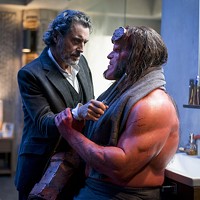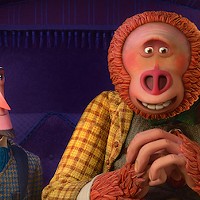

THE GREGORY PECK COLLECTION (1952-1966). It's hard to believe that a star of Gregory Peck's magnitude has never received his own DVD box set, but here comes Universal Studios Home Entertainment to correct that oversight with a six-title collection. All but two of the films (Cape Fear and To Kill a Mockingbird) are making their debuts on DVD.
Although it's all but forgotten today, The World in His Arms (1952) was one of the films produced by Universal to commemorate the studio's 40th anniversary; it was a wise selection, ending up as one of the year's top 20 moneymakers. Set in the mid-19th century, it stars Peck as a sea captain and seal poacher who divides his time between wooing (and later rescuing) a Russian countess (Ann Blyth) and antagonizing his seafaring rival (Anthony Quinn). Peck enjoys better on-screen chemistry with Quinn than with Blyth; the actors would team up twice again the following decade in The Guns of Navarone and Behold a Pale Horse.
With the suspenseful thriller Cape Fear (1962), Peck not only landed the lead role but also served (in an uncredited capacity) as one of the film's producers. Robert Mitchum delivers one of his best performances as Max Cady, an ex-con who swears vengeance on Sam Bowden (Peck), the lawyer he blames for his incarceration. Cady sets about terrorizing Bowden's wife (Polly Bergen) and teenage daughter (Lori Martin), but since he's always careful to stay just within the boundaries of the law, Bowden eventually realizes that he might have to take matters into his own hands to keep this psycho away from his family. The score by Bernard Herrmann (Psycho) is superb, and Martin Balsam (as a sympathetic sheriff) and Telly Savalas (as an overconfident private eye) offer strong support. Martin Scorsese helmed a solid remake in 1991, although Robert De Niro's Max Cady pales next to Mitchum's.
What's left to say about To Kill a Mockingbird (1962), a masterpiece that, as film critic Leonard Maltin noted, "only gains in stature as time passes"? Based on Harper Lee's Pulitzer Prize-winning novel, this casts Peck as progressive lawyer Atticus Finch, a widower who does his best to raise his two children (Mary Badham as Scout and Phillip Alford as Jem) in a small Alabama town in the 1930s. Having already placed on the American Film Institute's list of the 100 greatest American movies, this earned more kudos from the group when Atticus Finch landed in the number one spot on its greatest heroes list, edging out Indiana Jones and James Bond. Nominated for eight Academy Awards (including Best Picture), this earned three statues, for Best Actor (Peck winning on his fifth and final nomination), Best Adapted Screenplay, and Best Black-and-White Art Direction-Set Decoration.
Somewhat anticipating M*A*S*H in its exploration of the effects of war on military doctors and the patients in their care, Captain Newman, M.D. (1963) is an interesting comedy-drama with Peck cast as the head of a psychiatric ward during World War II. In charge of a facility that's understaffed, the overworked Newman turns to both an opportunistic orderly (Tony Curtis) and a compassionate nurse (Angie Dickinson) to help him with his patients, specifically ones played by Robert Duvall, Eddie Albert and singer Bobby Darin. As was often the case with Curtis during his prime, his wisecracking character eventually wears out his welcome, but the other actors do fine work, and the film's subject remains topical even today. This earned Oscar nominations for Best Supporting Actor (Darin), Best Adapted Screenplay, and Best Sound.
Long requested by film buffs as a movie worthy of a DVD release, Mirage (1965) finds Peck playing another amnesiac (the first time was in Hitchcock's Spellbound). Here, he's David Stillwell, a cost accountant who might somehow be mixed up in the death of his boss (Walter Abel), who plunged dozens of floors from a New York skyscraper. Drawing a blank on the past few years, repeatedly being menaced by thugs, and unable to identify the woman (Diane Baker) who insists they know each other, Stillwell finally turns to an affable gumshoe (Walter Matthau) to help him put all the puzzle pieces together. Memorable villains and veteran Edward Dmytryk's atmospheric direction punch this one across, although it's Matthau who steals the show with a terrific characterization.
Director Stanley Donen had a box office hit in 1963 with Charade, a sophisticated lark with two beautiful actors (Cary Grant and Audrey Heburn) on the run from international crooks. Rather than tamper with a winning formula, Donen followed it three years later with Arabesque (1966), another sophisticated lark with two beautiful actors (Peck and Sophia Loren) on the run from international crooks. Peck plays a university professor whose expertise with hieroglyphics lands him in the middle of a Middle Eastern conspiracy; Loren co-stars as an oil tycoon's mistress who finds her allegiances shifting once she becomes involved with the American academic. This was Peck's final box office hit for an entire decade; he followed this with seven flops before headlining the 1976 commercial smash The Omen.


